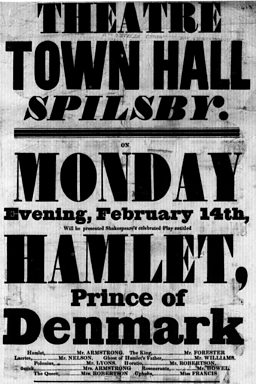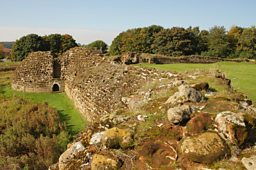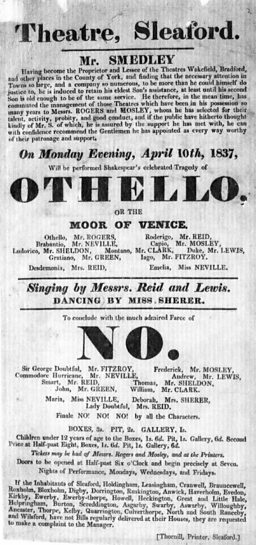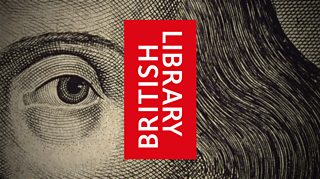Lincolnshire's early Shakespeare performances
Travelling was the key to seeing Shakespeare performed in sparsely populated rural Lincolnshire.
In the 18th and 19th centuries, although theatres were beginning to establish themselves outside of London, many provincial towns such as Sleaford and Spilsby would not have a permanent theatre.
-
![]()
Much ado near me
Hear more Shakespeare stories on BBC Radio Lincolnshire
-
![]()
Shakespeare Festival 2016
The BBC celebrates the genius of the bard

Travelling players in the time of Shakespeare himself tended to perform in the Guild Hall or Moot Hall. This performance in Spilsby continues the tradition… with the Town Hall serving as the venue.
As was also the case in Shakespeare’s time in the English provinces, the players would have been licensed to perform there by the local magistrate for a short period of time before they moved on.
Their choice in this instance, a couple of centuries or so later, is one of Shakespeare’s more popular plays, the tragedy of Hamlet.
Mr Armstrong is in the role of Hamlet, his wife is the affected courier Osrick who is sent by the King to invite Hamlet to a duel with Laertes.
It is interesting that a woman is cast as Osrick, as many of the British Library playbills collection have an actor in the role.
A sense of history in Spilsby
The spectators watching this royal revenge tragedy would have been aware of other links with Shakespeare.
The remains of Bolingbroke Castle, damaged during the Civil War, stand in Spilsby.
Henry de Bolingbroke was born there in 1366. At the age of 32 he become King Henry IV of England and Shakespeare tells his story in Richard II.

In this playbill from the British Library collection, we see how theatres in relatively sparsely populated parts of Lincolnshire relied on people from outlying villages coming to town to fill up the theatre.
This 1837 playbill is for a performance of Othello in an unknown theatre in the market town of Sleaford in Lincolnshire.
It was the year in which Queen Victoria was to take over the throne and Charles Dickens wrote Oliver Twist.
The playbill actually includes a list of villages and towns around Sleaford where the management looked to fill up the theatre. If the inhabitants of these villages were having any difficulty in receiving theatre playbills, then they are being encouraged to complain to the manager.

About Shakespeare on Tour
From the moment they were written through to the present day, Shakespeare’s plays have continued to enthral and inspire audiences. They’ve been performed in venues big and small – including inns, private houses and emerging provincial theatres.

BBC English Regions is building a digital picture which tracks some of the many iconic moments across the country as we follow the ‘explosion’ in the performance of The Bard’s plays, from his own lifetime to recent times.
Drawing on fascinating new research from Records of Early English Drama (REED), plus the British Library's extensive collection of playbills, as well as expertise from De Montfort University and the Arts and Humanities Research Council, Shakespeare on Tour is a unique timeline of iconic moments of those performances, starting with his own troupe of actors, to highlights from more recent times. Listen out for stories on Shakespeare’s legacy on your BBC Local Radio station from Monday 21 March, 2016.
You never know - you might find evidence of Shakespeare’s footsteps close to home…
Craig Henderson, BBC English Regions
-
![]()
Shakespeare Lives
The nation’s greatest performing arts institutions mark 400 years since the Bard's death
Related Links
Keeping theatre in the family
As is usual, the Shakespeare play on offer – Othello - is just part of an evening of entertainment that includes songs, dancing and a farce called No.
Here, the manager Mr Smedley announces he’s just become the proprietor and licensee of theatres in Wakefield and Bradford and other theatres in York.
These new responsibilities means that he has too much on his plate to look after Sleaford as well, so he proposes to bring in his eldest son for this role, at least, until his second son is old enough.
In the short term, he has committed the management of the theatre to Mr Rogers and Mr Mosley, who are playing Othello and Capio in the production.
This model of the actor manager figure mirrors Shakespeare’s day, when the dramatist himself was closely bound up with running the theatre and was a 'sharer' in its profits.
Strolling players often included members of the same family as the lifestyle led to marriages and children and professional and personal relationships intertwined.
Mr Smedley is not unusual in bringing his sons into the business.
The famous Kemble family reigned over the theatre for decades around the end of the 18th century. The offspring of Roger Kemble, a travelling actor and manager who married an actress, included actor-manager Stephen Kemble who managed many provincial theatres, his brothers John Philip and Charles and the most celebrated actor in the family, Sarah Siddons.
Today theatrical dynasties such as the Foxes (brothers James, Edward, and Robert plus Edward’s Emilia and Freddie and their cousin Laurence ) continue the tradition...
Shakespeare on Tour: Around Lincolnshire
-
![]()
Shakespeare is the star in Stamford
The playwright's own life is turned into a drama
-
![]()
Belvoir Castle
Belvoir Castle, home of the Duke of Rutland
Shakespeare on Tour: Around the country
-
![]()
Whitby, wealth and a Shakespearean bachelor night
The Bachelors of Whitby sponsor a performance of Merchant Of Venice
-
![]()
A new king and rebranded Shakespeare’s players head first for Shrewsbury
James I established the ‘King’s Men’ as his official group of theatre players
-
![]()
Shakespeare's men perform before the King at Wilton in Salisbury
A royal audience in Salisbury
-
![]()
Caludon Castle: Did Shakespeare perform here for ‘Henry the Harmless’?
Was Shakespeare there during the 1593 'Plague Tour'?









